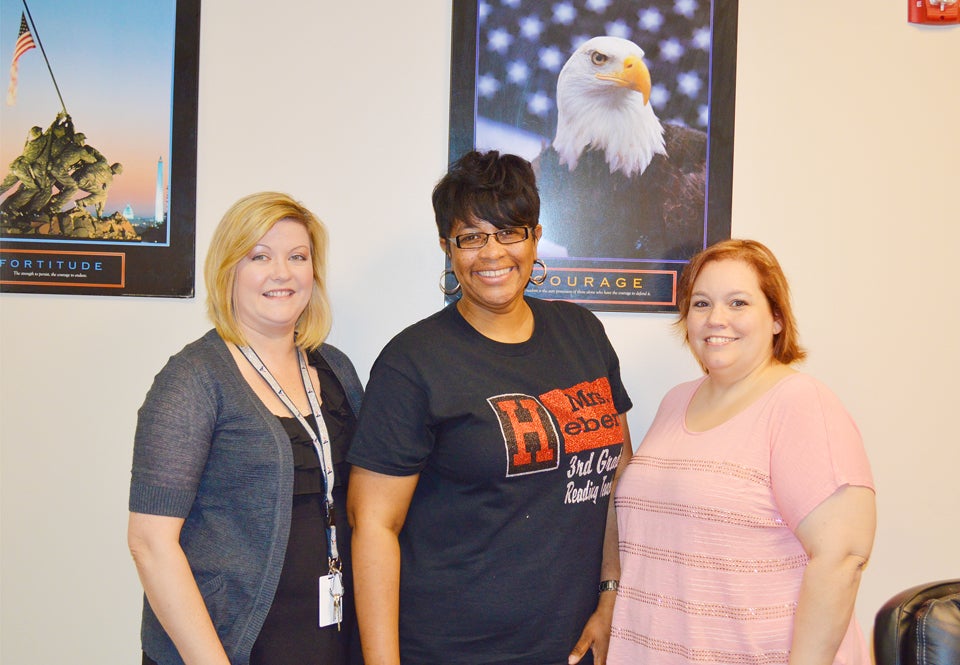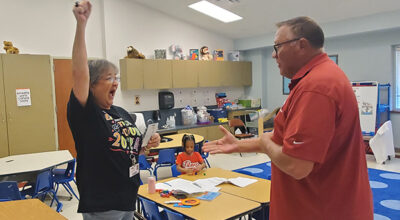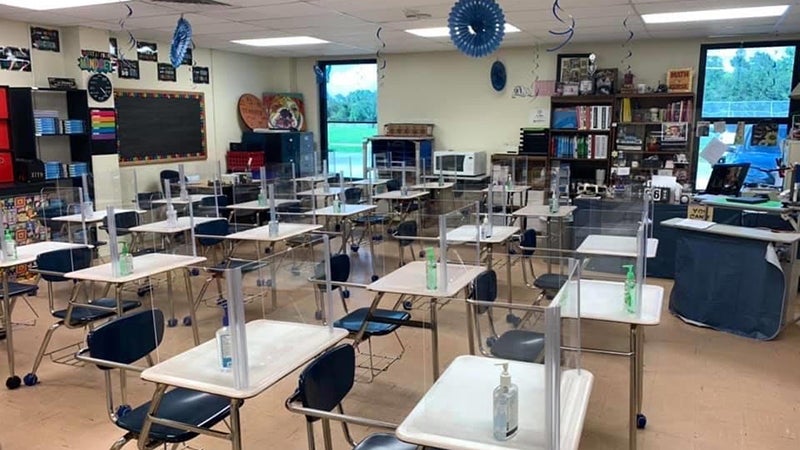PAISD teachers talk ‘intimidating’ first years
Published 5:00 am Sunday, June 28, 2015

- Dana Daniels, William B. Travis Elementary School fourth grade reading teacher, left, Tamela Hebert, William B. Travis third grade reading teacher, and Misty Zeigler, Tyrrell Elementary School fifth grade science teacher, shared their experiences teaching in the Port Arthur Independent School District June 3 in the PAISD Administration Building.
New year-long program to tackle insecurities, uncertainty
Inexperienced teachers starting out in the Port Arthur Independent School District are fumbling for more guidance and instruction in their own classrooms.
PAISD Mark Porterie said he’s prepared to give them unlimited advice and training via a new professional staff development course, specifically designed for new teachers, online.
“We had a meeting (in the spring) with our first- and second-year teachers to see in what ways could we better support them,” Porterie said. “We basically asked them, ‘What do you wish we had done for you in this first and second year as a new teacher?’ A majority of them asked for more supplies, help with classroom management and more assistance with teaching the state curriculum — the Texas Essential Knowledge and Skills curriculum. I’ve spent a long time getting my research together, but I think I’ve figured it out.”
Each teacher in the district with five years experience or less will begin a year-long online course this fall, Porterie said, in response to grievances he heard during his meetings with inexperienced teachers throughout the 2014-15 school year.
Misty Zeigler, who just completed her first year teaching in the Tyrrell Elementary School fifth grade science department, joked she “probably blew those kids” away. She said what she lacked in experience, she made up for in enthusiasm.
“When I first started, every single thing was a must have — everything I did was just full force,” Zeigler said, adding she would have felt more confident starting the 2014-15 school year if the district had more resources available to new teachers. “I kept wishing we could have campus meetings, even if they were just grouped into the different departments.
“Have the entire science department get together at the beginning of the year and say, ‘This is what we’re looking to do this year. These are the resources we have to pull from.’ I guess I wanted to hear more from the veteran teachers — what they’ve seen as a common thread in their students, how to incorporate the curriculum into every class activity, those kinds of things.”
The Port Arthur ISD already pairs new teachers with “veterans” — those with the district 10 years or more — but the new online staff development course would give the rookies unlimited, round-the-clock access to experienced educators at their fingertips, Porterie said.
Dana Daniels, a fourth grade reading teacher at William B. Travis Elementary School who just completed her first year and a half teaching, said she started the 2014-15 school year with a mentor, but her pairing was less than successful.
“My mentor helped me learn the process — issuing books, just the general things — but we didn’t get into how to go about teaching the curriculum or how to apply what I learned in school about discipline to a live group of students in my own class,” Daniels said.
“I went through the Region 5 Alternative Program, so I had to have a mentor,” Zeigler added. “ But he had me, another new teacher and a substitute, so he had his hands full. The support was there for me, but as far as having a wading period before you have to jump in on the first day — that wasn’t ever there. The beginning is scary and you’re not entirely sure of yourself. It’s like you’re swimming with sharks, hoping to figure out survival skills on the spot.”
Tamela Hebert, a William B. Travis Elementary School third grade reading teacher who just completed her 10th year teaching in PAISD, said she was blessed to begin her career with a devoted mentor and much smaller class sizes than many new teachers are faced with today.
“I spent my first two years at Wheatley (School of Early Childhood) watching another teacher lead her class. I was able to pick up things she was doing before I started adding my own creativity to it,” Hebert said. “You’re never finished learning as a teacher — you will continue to evolve your methods as time goes on — but I know for an incoming teacher, the state objectives we have to teach now have to look so intimidating.
“Because you’re given all these lists of objectives and bullet points with all the knowledge you have to give your students in a very short period of time. You just look at it and all you can think is, ‘How in the world am I going to teach them all of this in the time we have?’ The curriculum we have now is a lot to teach, and it says I’m supposed to do all this in one day.
“But as the years go on, you learn what’s important and how to embed lessons within lessons. You start reinforcing old lessons and drawing on them as you introduce something new. A veteran teacher knows, ‘I can continue to teach these things here while I embed these new concepts into our lesson.’ But when you’re first starting out, it looks like this impossible task — and if you don’t have a strong support system, you feel so alone.”
Daniels said “vertical alignment” meetings throughout the 2014-15 school year helped her fight off the lonely, drowning feeling.
“Each grade level on the same subject talked about what we were doing inside our classrooms. We all came in with our lesson plans, and it really helped me understand how the subject matter progressed from one grade to the next,” she said. “It felt less intimidating when I could prioritize what I needed to be doing to prepare my students for the next year.”
Zeigler said her hard-earned lesson for her first year as a teacher came directly from her students.
“I would tell all new teachers to be flexible and have an open mind. Because it’s all going to change,” she said. “You write your lesson plan, and it’s all pretty on paper. But you have to be able to adjust to what the students need. Because it’s not about what you need or what you want. It’s all about the students.”
Hebert said her best advice to rookie teachers is to know the curriculum backwards and forwards — inside out and upside down, if necessary.
“The most important thing is to understand what you’re teaching,” she said. “For one thing, the kids know when you don’t know it. But if you understand it, you can figure out different ways of teaching it. It’s about adjusting the lesson, extending the lesson, engaging the lesson — it has to make sense to every child in the room.”
Zeigler and Daniels said they’re interested to see what other “veteran” knowledge they’ll gain from the district’s new professional staff development course this fall.
“As much of a crazy roller coaster it was for me, this was the best year of my life,” Zeigler said, laughing.
Twitter: @crhenderson90





